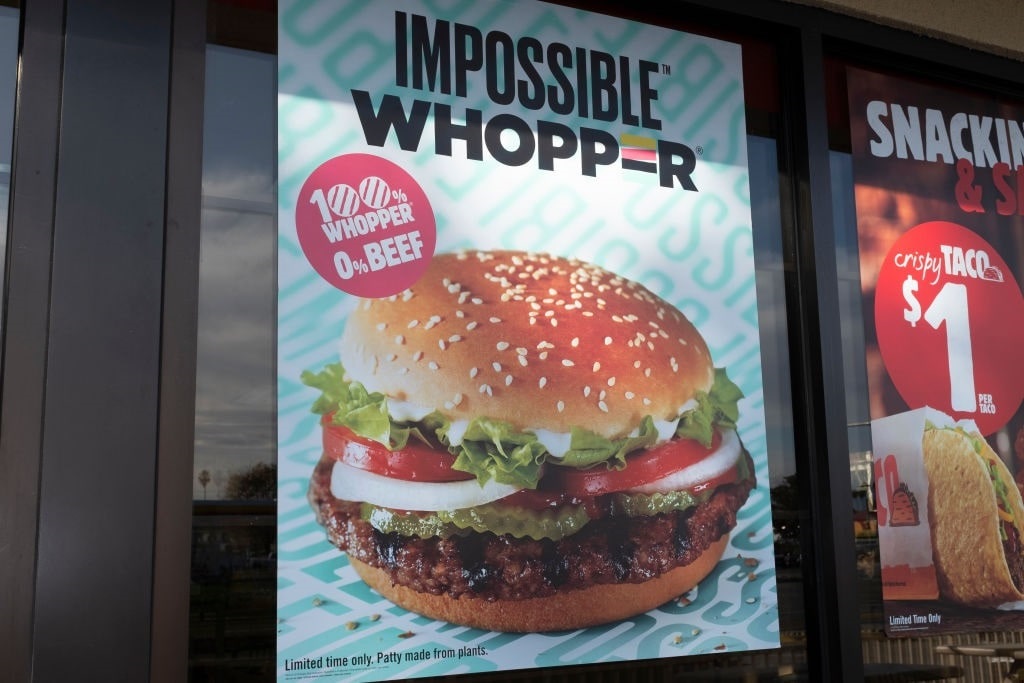Iowa has become the latest state to signal hostility toward fake meat food products, imposing fines of up to $10,000 on manufacturers who mislabel protein-based products as meat. Other states, including Florida, have banned meat-simulating products outright rather than require labeling. Meats “cultured” from plant proteins in a laboratory are not available for sale on Americans’ grocery store shelves. Still, the growing culture wars over their future reveal much about the products themselves.
 Advocates for restricting or labeling these nouveau meat substitutes argue that confusing labels deceive consumers, meat-copied products are unsafe to eat, and globalists seek to compel human dependency on alternatives to nature’s provision. Those opposing such restraints invoke free markets, consumer choice, and unfair favoritism for industrial agriculture as their rallying cries. These voices claim fake meat will save the world from existential climate doom, end animal suffering, and offer people healthier eating choices.
Advocates for restricting or labeling these nouveau meat substitutes argue that confusing labels deceive consumers, meat-copied products are unsafe to eat, and globalists seek to compel human dependency on alternatives to nature’s provision. Those opposing such restraints invoke free markets, consumer choice, and unfair favoritism for industrial agriculture as their rallying cries. These voices claim fake meat will save the world from existential climate doom, end animal suffering, and offer people healthier eating choices.
Food is now fair game in the culture war crossfire, especially manmade food versus “natural” food grown and processed traditionally. There is no evidence that cell-grown meats carry a cancer risk. There is, however, ample evidence that the three main drivers of fake meat consumption – animal welfare, human health, and ecological impact – are not served by processed meat alternatives. It also is increasingly evident that, despite billions of dollars in investment, fake meat cannot be grown at scale or cost-effectively, meaning the entire brouhaha over labeling and banning may prove to be a red herring dispute over products that will never actually exist.
Left-wing media has pounced on red-state bans and labeling initiatives of fake meat as culture war paranoia, often gushing about how these nouveau foodstuffs will stave off animal cruelty, rescue humanity from climate-destroying agriculture, and provide cheap, healthy food to the world’s poor. In the rush to distort science to advance political notions, such dreams are popular – just not scientific. Using animals for food is not cruel if they are slaughtered humanely after a life of conscientious husbandry. Advocates of plant-only diets call to eliminate all animals from the food chain because of the alleged abuses of industrialism, ignoring that millions of livestock enjoy balanced lives with no suffering, as has been the case for eons.
Similarly, cows and other animals rotationally grazed rather than confined in feedlots are not the destroyers of the ecosystem but its saviors. Cows on grass sequester more carbon dioxide and methane in the soil with their manure than they ever belch out, improving water retention and soil health in the bargain. Synthetic fertilizers used to grow plant-meat (or vegan) diets destroy soils and the microbiome. GMO crops dependent on glyphosate and fossil fuels for production and harvesting compromise human and ecosystem health.
Fake Meat Opponents Bashed
Nevertheless, the usual cow-bashing suspects have proliferated to criticize those who oppose fake meats as ill-informed, unenlightened attackers of consumer liberties (or, as one opinion claimed, “low-IQ red state denizens”). Popular Science unscientifically claimed that “Republican lawmakers opposed to cultivated meat, broadly, have attempted to connect the industry to a larger supposed culture war.”
There is most certainly a broader culture war at play, in which newfangled science partnered with venture capitalist profiteers seek to impose their products on unsuspecting consumers. Republicans are faulted for invoking a “culture war” over transgenderism, yet, like fake meat, that “supposed” conflict is a recoil against novel surgeries and hormones for children touted as lifesaving. So too are changes in America wrought by critical race theory and new vaccine technologies.
Vox characterizes challenges to fake meat as an unscientific attack against farmers by corporate profiteers:
“On the surface, bills aiming to ban cell-cultivated meat could be waved away as mere political theater, a ratcheting up of the culture war by attacking alternatives to factory-farmed meat as a cheap way to own the libs during an election year.
“But there’s something more troubling at play here. The proposed bans are part of a longtime strategy by the politically powerful agribusiness lobby and its allies in Congress and statehouses to further entrench factory farming as America’s dominant source of protein.
“If lawmakers are really concerned with deceptive labeling, they may want to focus their efforts in the meat and dairy aisle, where consumers have long been misled by warm and fuzzy terms like ‘sustainable’ and ‘humanely raised,’ both of which have no legal definition.”
Vox is advocating for a multi-billion-dollar food processing industry hellbent on profiting from meat-simulating GMO plants as a cheap way to own the food supply. Pointing fingers at the “politically powerful agribusiness lobby” hardly excludes the fake meat industry: Many of the world’s largest meat producers and processors are also heavily invested in the fake meat market. GMO labeling requirements enable consumers to make informed purchasing decisions: Why should meat-buying be any different? If the terms “sustainable” and “humanely raised” are suspect, then what of the ubiquitous clamor over the warm and fuzzy term “renewable”?
Fake meat fantasies closely resemble renewable manufacturing boondoggles. That vague term conceals the simple truth that supposedly “renewable” products end up in landfills, generate massive quantities of chemical pollutants in their manufacture, are heavily subsidized, enjoy regulatory favoritism. GMO crops are favored with massive federal subsidies, then used to fabricate fake meat in huge vats in climate-controlled factories, polluting the planet far more than cows munching grass. And so Americans are quite right to scrutinize the claimed benefits, as well as implicit shortcomings, of meat imposters.
The fake meat debate will fade faddishly into the rearview mirror. Cultured meats cannot be produced at scale, cost-effectively, or without creating more environmental harm than benefit. They will not succeed in a free market any better than EVs, even if they do taste like that which they seek to copy. A ban of fake meats is unnecessary, but protecting buyers by clarifying what is in their foods is fundamentally just. Ensuring fake meat products are clearly labeled will sufficiently inform consumers to avoid them.




